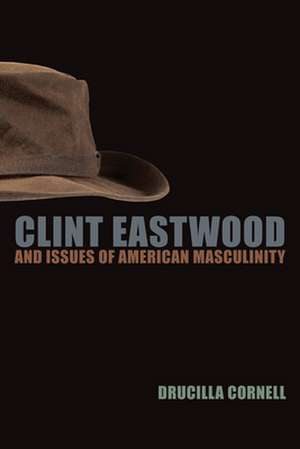Clint Eastwood and Issues of American Masculinity
Autor Drucilla Cornellen Limba Engleză Hardback – 14 iun 2009
Preț: 530.08 lei
Preț vechi: 654.42 lei
-19% Nou
Puncte Express: 795
Preț estimativ în valută:
101.43€ • 108.46$ • 84.57£
101.43€ • 108.46$ • 84.57£
Carte tipărită la comandă
Livrare economică 17 aprilie-01 mai
Preluare comenzi: 021 569.72.76
Specificații
ISBN-13: 9780823230129
ISBN-10: 0823230120
Pagini: 232
Dimensiuni: 160 x 236 x 22 mm
Greutate: 0.43 kg
Editura: ME – Fordham University Press
ISBN-10: 0823230120
Pagini: 232
Dimensiuni: 160 x 236 x 22 mm
Greutate: 0.43 kg
Editura: ME – Fordham University Press
Recenzii
"This is an ambitious, innovative project that seeks to bring together popular culture studies with political philosophy. Throughout there are many sparkling insights and provocative discussions that ramify far beyond Eastwood's work and invite a broader discussion of the ways in which gender might be thought in relation to democracy theory, law, and ethicality." - Sara Murphy, New York University "An exciting read, in which Eastwood's work and his personal struggle come alive for us, together with a rich layer of conceptual analysis that is equally vivid." - Jessica Benjamin, author of Like Subjects, Love Objects: Essays on Recognition and Sexual Difference"
Notă biografică
Drucilla Cornell was Professor Emerita of Political Science, Comparative Literature, and Women¿s and Gender Studies at Rutgers University; Professor Extraordinaire at the University of Pretoria, South Africa; and a visiting professor at Birkbeck College, University of London. With a background in philosophy, law, and grassroots mobilization, she played a central role in the organization of the memorable conferences on deconstruction and justice at the Benjamin N. Cardozo School of Law in 1989, 1990, and 1993. She was the author of The Philosophy of the Limit (1992), Feminism and Pornography (2000), and Law and Revolution in South Africa: uBuntu, Dignity, and the Struggle for Constitutional Transformation (2014). She has also coedited several books: Feminism as Critique: On the Politics of Gender (1987), with Seyla Benhabib; and Hegel and Legal Theory (1991) and Deconstruction and the Possibility of Justice (1992), with David Gray Carlson and Michel Rosenfeld. She was part of a philosophical exchange with Seyla Benhabib, Judith Butler, and Nancy Fraser entitled Feminist Contentions (1995). In addition to her academic work, she wrote four produced plays.
